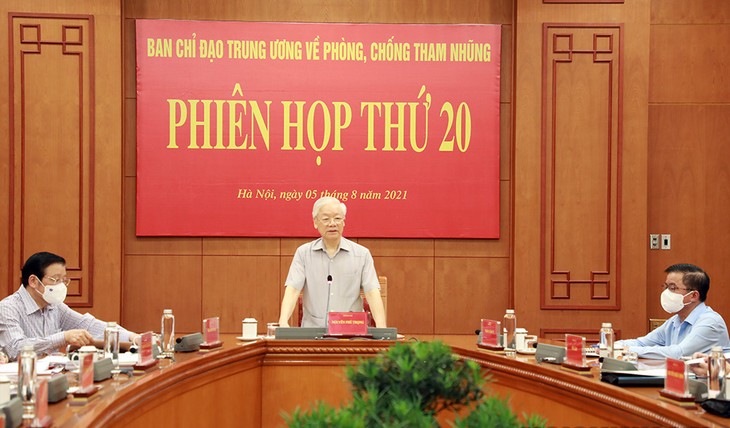(VOVWORLD) - Corruption has been reported in many countries around the world, including both developed and less developed countries, requiring a stronger joint effort from the international community. In Vietnam, the Vietnamese Party and State have been resolute in fighting corruption, especially since Vietnam signed the UN Convention on Anti-Corruption on December 9, 2003.
 Party leader Nguyen Phu Trong speaks at a meeting of the Central Steering Committee for Anti-Corruption (photo: noichinh.vn) Party leader Nguyen Phu Trong speaks at a meeting of the Central Steering Committee for Anti-Corruption (photo: noichinh.vn) |
The Communist Party of Vietnam considers corruption an internal enemy and a major threat to the existence of the regime and to national development. Preventing and fighting corruption has been a consistent policy of the Vietnamese Party and State. Since the 12th National Party Congress in January, 2016, Vietnam has achieved remarkable results in the fight against corruption and has drawn international praise.
Vietnam set up a Steering Committee for the Anti-Corruption Fight in February, 2013, chaired by Party General Secretary Nguyen Phu Trong, who is responsible to the Party Politburo and the Party Secretariat for directing, coordinating, overseeing, and managing the fight against corruption. Through the strong determination and will of Mr. Trong and the Steering Committee, Vietnam’s fight against corruption has achieved several breakthroughs. With consultation by the Steering Committee, the Party Central Committee set orientations and guidelines on fine-tuning the legal system and devised solutions to make the fight against corruption more effective.
The Party has focused on implementing coordinated solutions to fight corruption in all socio-economic spheres and all Party organizations. The Party and State have issued regulations to strengthen Party building, the political system, and the fight against corruption, and prevent and deal with violations.
The Party Central Committee, the Party Politburo, the Party Secretariat, and think-tank agencies of the Party have also issued guidelines and solutions to strengthen the Party and fight corruption.
The National Assembly, the government, ministries and agencies have reviewed, amended, supplemented, and issued new regulations on socio-economic management, fighting corruption, and preventing negative tendencies and special interests.
Vietnam has focused on personnel work, strengthened administrative reforms and transparency in state agencies, and implemented measures to fight corruption. Many regulations have been issued and revised to rally public support for this fight.
Inspection and auditing agencies have been consolidated with clear description and designation of functions and authorities to promptly deal with violations. Disciplines have been strengthened to improve their effectiveness in the fight against corruption.
The Party Central Committee’s Inspection Commission has worked resolutely, carefully, and transparently to expose serious violations. The Commission has urged the Party Central Committee, the Party Politburo, and the Party Secretariat to impose disciplinary measures and punish a number of high-ranking officials and Party organizations that have committed violations.
This is a breakthrough in the Party’s oversight work which aims to strengthen disciplines, regulations, and the Party and State apparatus, and improve the effectiveness of the fight against corruption. This effort has been widely praised by the public.
Vietnam has also boosted cooperation with many countries in APEC, ASEAN, and the EU and with international organizations to strengthen the fight against corruption and contribute to the global effort. Many countries have learned from Vietnam’s experience.
With its achievements in the fight against corruption, Vietnam scored 36/100 to rank 104/180 on the Corruption Perception Index of Transparency International (TI). This was an international recognition of Vietnam’s anti-corruption effort.
Vietnam’s improvement is of particular importance because other countries, including several ASEAN countries, dropped in this year’s ranking.
Professor Carl Thayer of the Australian Defense Force Academy says that fighting corruption in Vietnam does not mean dealing with a group of violators but fixing loopholes in the legal governance system.
Professor Dennis McCornac of Loyola Maryland University in the US says improvements have been made since Vietnam’s law on anti-corruption became stricter. Foreign investors are confident that Vietnam is determined to fight corruption and create a transparent business environment. Miguel Chanco, an ASEAN expert of the Economist Intelligence Unit (UK) says foreign investment in Vietnam has continued to grow since 2016 when Party leader Nguyen Phu Trong strengthened the fight against corruption.
Positive achievements and international acknowledgement are motivating Vietnam to step up its fight against corruption and contribute to the effort to push back corruption globally.